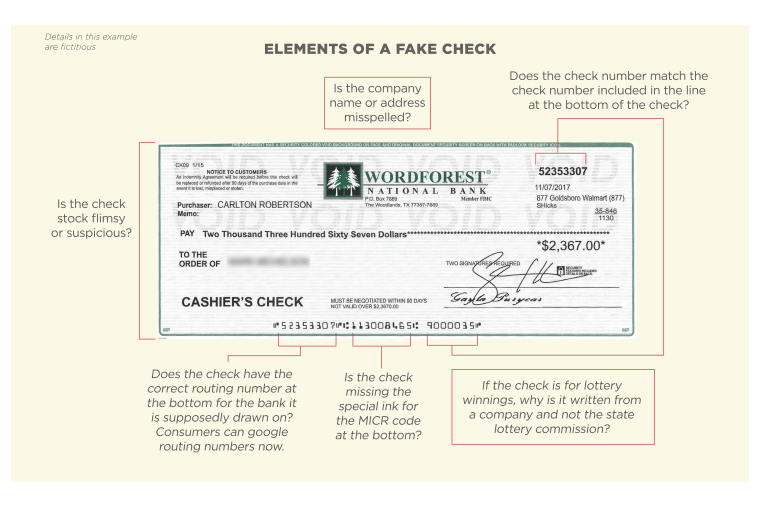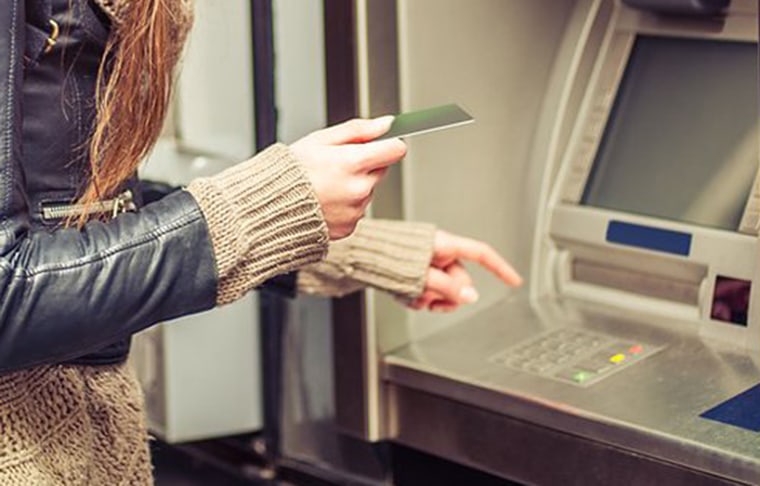You just received a check to pay for something you’re selling on Craigslist or to cover your first assignment as a mystery shopper. Think you could tell if it’s real or fake?
Chances are you couldn’t — and con artists are counting on that. Counterfeit checks, often digitally altered versions of real business checks, are so good that they’re nearly impossible to spot — even bank tellers can be fooled.
It’s estimated that as many as 500,000 Americans were burned by fake check scams last year, with the average victim losing about $1,200, according to a new report from the Better Business Bureau.
Check fraud is “a huge problem,” the report says, with “millions of fake checks worth billions of dollars circulating every year.” Complaints to government agencies and consumer advocacy groups have doubled over the last three years.
Fake checks and counterfeit money orders are now used in a variety of scams. Here are some common scenarios:
- Classified ads: You’re selling something on Craigslist or some other online classified ad site and the “buyer” sends you a check for more than the selling price. “Sorry, we made a mistake,” they say. “Just deposit it and wire back the difference.”
- Prize scams: You’ve won a big sweepstakes or lottery prize, but you need to pay the taxes and handling costs to claim it. No worries, they’re sending you a check to cover those expenses — just deposit it and send the money to a third party.
- Employment scams: You’ve been hired for a work-at-home position, but you need to buy some supplies to get started. Your new “employer” sends you a check to cover those expenses and tells you where to wire the money to buy them.
These schemes all work the same way: The intended target is sent a check or money order to deposit in their checking account. They’re instructed to send some of that money to another person or company, typically by Western Union or MoneyGram.
Once the check is returned for being counterfeit, the victim has already sent off the money to the crooks. In most cases, the bank will not return the money because the check was bad.
The secret sauce that makes this con so successful
Why do so many people wire money to complete strangers? Because they don’t understand how the banking system works. When you deposit a check and the funds show up in your account as “available,” it does not mean the check is valid.
Federal rules require the bank to make those funds available, in most cases, within a day or two. But the bank has the right to recover the money from the account holder, if the check is found to be counterfeit — and that process can take a week or two.
“Crooks know this chink in the banking system and they're taking full advantage of it,” said Steven Baker, BBB International Investigations specialist. “It’s incredibly devious and you can see how anyone can fall for it.”
One more warning: A cashier’s check is assumed to be as good as cash, but they’re also being counterfeited to use in these scams.
No warning signs
Kathy Derrick, who lives in a Chicago suburb, has plenty of experience in the business world as an executive assistant — and she still got taken for $2,000.
“I think they are awful, conniving people who are very smart and know exactly what they‘re doing,” Derrick told NBC News BETTER.
Derrick was contacted via LinkedIn for a work-at-home position with a well-known technology company. The email was professional, the online interview went well, and she was offered a good hourly rate.
To get started, Derrick would need to buy equipment and office supplies from one of the company’s vendors (actually the crooks) and she was sent several checks to pay for that. Derrick deposited them, waited for the money to show up in her checking account and then wired off the payments.
The supplies never came and there was no job, but the bank froze her personal checking account for three months, while it investigated why she’d deposited a bad check. Eventually, she got things worked out, but the bank would not put the $2,000 back in her account.
“There were no red flags. They looked like the real company’s checks with the real head of HR’s name and signature on them,” Derrick said.

Mystery Shopper Scam
Fake checks are most often used in mystery shopper scams, the BBB warns. The fraudsters send a check and instructions for the first assignment, often via a courier service to make it seem legitimate.
Mark Michelson received his “mystery shopper assignment” letter and a cashier’s check for $2,367 via FedEx. The bogus check looked real and the letter falsely said the company was BBB Accredited and a member of the Mystery Shopping Providers Association (MSPA).
Michelson, who runs a marketing research company in Atlanta, started the MSPA in 1997 to fight fraud, so he knew this was a scam. He decided to play along to see what would happen.
He was instructed to deduct $257, as his commission for this assignment, and then go shopping. After making a small purchase at a local store and rating the experience, he was supposed to buy $2,000 worth of money orders and send them to another mystery shopper (a co-conspirator) for them to complete their assignment.
Once he made contact with the bogus mystery shopping company, there was constant pressure to get going, Michelson told NBC News BETTER.
“They were persistent, emailing me two or three times a day: ‘Send the money right away,’ ‘Our clients are waiting, we need to get this completed now,’ ” he recalled.
Five days later, the bank notified him that the cashier’s check was a fake. If he had completed his assignment, Michelson would have lost $2,110.
Protect yourself
Anytime you are sent a check or money order from someone you don’t know and told to deposit the check and send off some money to them or a third party — stop and ask yourself, would any legitimate business transaction require me to do that? Simple answer: No.
At the very least, contact the Better Business Bureau and ask for their advice. You’ll also find various resources online:
- The Federal Trade Commission has tips on how to avoid fake check and mystery shopper scams.
- The US Postal Service has issued an alert on how to detect a fake money order.
- The Office of the Comptroller of the Currency has issued an alert about fake cashier’s checks.
Want more tips like these? NBC News BETTER is obsessed with finding easier, healthier and smarter ways to live. Sign up for our newsletter and follow us on Facebook, Twitter and Instagram.


